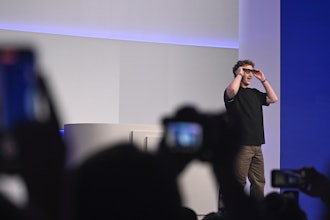Researchers Finally Made the Magic Fat Pill
Researchers from Nanyang Technological University in Singapore (NTU Singapore) have finally created the one true magic pill to fight obesity. The team has developed a prototype capsule that inflates in your stomach to make you feel full.
They call it the "EndoPil," and it contains a balloon that self-inflates after it's activated by a handheld magnet.
The handheld magnet triggers a reaction between acid and salt, which fills the balloon with carbon dioxide.
The idea is that the pill will be swallowed like any other, however researchers have yet to start clinical trials. For now, it worked on a pig that lost about 3.3 pounds in a week.
Last year, the team also performed a trial with a healthy patient volunteer, however the capsule was inserted with an endoscope. The balloon was successfully inflated within her stomach, and she didn’t experience discomfort or injury from the inflation.
Right now, it is quite a horse pill to swallow, measuring about 3 cm x 1 cm. After it’s triggered, the balloon expands to 120 ml and floats to the top of the stomach, which is more sensitive to fullness.
The balloon can then be deflated magnetically to a size small enough to enter the small intestines.
The team hopes to conduct another round of human trials within the year. First they need to make sure that the balloon can be naturally decompressed and expelled by the body, before testing the capsule for its efficacy.
If all goes well, it could one day replace other procedures like lap band surgery, which is invasive and still fails in 1 in 5 patients.
Researchers Fight Fire with Nanocellulose
Researchers from VTT Technical Research Center in Finland have created a new coating using nanocellulose.
Nanocellulose naturally adheres to wood and forms an airtight film on the surface. This makes nanocellulose-based coatings a good fit for the protective wood treatments.
The coating is based on HefCel technology (High-Consistency Enzymatic Fibrillation of Cellulose), which was developed and patented by VTT.
The coating can be sprayed or brushed on to the wood and it works by reducing the access of oxygen to the surface.
The coating could make a significant impact on the coatings market, particularly in construction materials.
The researchers recently designed new equipment that more efficiently and cost-effectively manufactures larger batches of HefCel and have seen promising results from it’s initial run.
Next, the researchers are looking to potentially commercialize the technology, which could be a possible fit for the paint industry, packaging, composites or simply as a coating industry raw material.
Samsung's Galaxy Fold Fails
Early reviews of Samsung’s new Galaxy Fold have been critical of the new folding screen, but I think the most hilarious came from iFixit as part of the website’s product teardown, “Like a beautiful butterfly, our Fold's life was tragically short … Also like a butterfly, this thing is alarmingly fragile.”
iFixit is a website that provides information to give people more access to repairs. Since some companies don't make parts or manuals readily available, the website is designed to work like one big (and free) repair manual, mostly to encourage people to fix things themselves.
According to iFixit, the phone is easy to get into, but had “overwhelming fragility” which isn’t a good sign if it’s going to demand a $2,000 price point. The teardown also noted that the Fold’s design had “a ton of entry points for dust and other foreign matter to make their way inside” as well as “many different ways for the screen to break.”
Overall, the teardown reinforced concerns from other design reviews, namely the mechanics of the fold wearing out and the high likelihood that the screen will need to be replaced, which is expensive.
Last week, Samsung put the Galaxy Fold on hold to make “further improvements.” The company didn’t give an updated launch date, which was originally set for April 26th.
The company also got iFixit has remove its teardown, which has caused quite a stir. That comment section is an entertaining read.
In the teardown, the authors said “Hopefully it can metamorphose into something a bit more robust to avoid the windshield of fate … Maybe with their extra time, Samsung can add a bit more reinforcement and some ingress protection, so these glorious wings may flap another day!”
This is Engineering By Design.






















